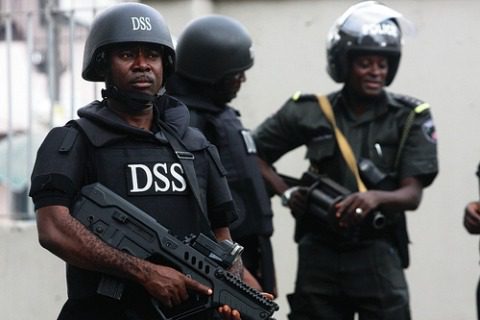National Issues
The Easy Way Out -By Sesugh Akume

This time 2 weeks ago, one would’ve been right to conclude as I did that the judges arrested that weekend and in the Department of State Security (DSS) custody for suspicion living above their means and professional misconduct were about to abscond and therefore needed to be prevented, and were certainly going to be arraigned the next day Monday. Presently, the judges are back home and their courtrooms, while the DSS is still ‘gathering more evidence’ and talking tough.
My great concern is that we don’t waste this opportunity as we’re wont each and every time. However, one of the worst arguments I saw in support of the DSS raid was that we already knew who General Buhari was before he was voted in, so we had better allow him to ‘fight corruption’ his own way. No, sir! We won’t allow any politician do things their own way. That is a lazy way out. Our reliance should never be placed on individuals, on politicians’ whims and caprices, but on institutions, systems, procedures, and processes. General Buhari had promised to create jobs, under his watch 4 million jobs and more have b
een lost. He promised to improve the value of the naira which at the time was exchanging at 216 to the dollar. Right now the naira is inching closer to the 500 naira mark, and is one of the worst performing currencies in the world. There are numerous examples of such growths he promised which have turned out to be negative. We can’t therefore let him go on as he understands things and deems fit. If General Buhari is allowed to ‘fight corruption’ his way, who is going to fight the corruption in and/or around him?

First off, the DSS isn’t an anti-corruption body, there are bodies whose specific job is to tackle financial crimes certainly not the DSS. Arguments in favour said the DSS’ job in internal security, and a corrupt judge is as much a threat to our national security as a coup plotter or an armed robber. I guess this also enables the DSS to address the professional misconduct of judges? These arguments mean that tomorrow the Civil Defence or Peace Corps can also stretch get warrants and go kicking on judges’ doors. Next tomorrow it’ll Road Safety. We all hate and are fighting corruption, and professional misconduct right? It needs to be repeated that since the first coup in all 1966, all coup plotters have cited corruption as the reason for their takeover or attempted take over. Does it therefore mean that it’ll be okay if another coup took place today and plotters cited corruption in this administration starting from General Buhari’s kitchen cabinet, through his living room, kitchen, and ‘the other room’? Citing ‘fighting corruption’ an the reason for not doing things according to the process and procedure the way it should be is an easy way out.
General Buhari’s insulting judges whilst on foreign trips doesn’t begin to address the rot in the judiciary and the justice sector as a whole. From,the DSS’ leaked correspondences with the National Judicial Council (NJC) it is clear that by the NJC refusing to play ball, the DSS had to use the brute force available to them to deal with the judges, which seems more like vendetta to me. Unfortunately I don’t see how this approach works in the mid- and long term, as the normal route would be to arraign these before fellow judges. If the judiciary deems it as a war against them and their independence, I don’t see how this would work. Except of course the DSS hope to set up a tribunal before whom the guilty judges will be arraigned from where they’d frog-marched to Old Parade Ground, Abuja and shot. Or as someone advised when we were discussing last week, the best approach is kill the judges, after all the state wields enormous powers. Kill them, pretend to be investigating the matter and kill some more, the new judges replacing the dead ones would learn their lesson and do the right thing. This is how far we’ve sunk refusing to imbibe democracy and its ethos, after 17 uninterrupted years of civil rule.
To be sure, the Nigerian judiciary is rotten. Just this past week I was at the Appeal Court Abuja. The 2 policemen sitting behind the 3 judges slouched on their seats and dozed all through till the court rose. There were broken chairs everywhere in the courtroom, not a flag, not even a wall clock. Just outside the courtroom was reeking from the nearby convenience. This says a lot about the entire setup. This is a higher court, and in Abuja. Imagine what is obtainable elsewhere. Many times the judgements from these courts apart from sometimes being bought make absolutely no sense even to the judges delivering them themselves. The NJC whose job it is to ensure the sanctity and dignity of the judiciary; that judges keep doing the right thing and those who don’t are disciplined in order to keep the sacredness of the justice system has failed beyond words in this regard. It has managed to attend to less than 5 percent of reports of judges’ wrongdoing (80 out of close to 2,000 complaints) and worse off, lies about it. Of that infinitesimal number of judges disciplined, most were left off the hook, which serves as no deterrent to others, nor instills public confidence. Kicking judges’ doors, or killing them doesn’t begin to address this issue. At least I don’t see how.
Nigerian courts go on vacation for 2 months every year, and 2 weeks every Easter and Christmas. Effectively, the courts sit only 9 months a year. The colonial judges who introduced this system, who had to return to Britain for long vacations also sat on Saturdays. Our present-day judges don’t sit on Saturdays but observe these plus the numerous public holidays. Many courts sit only Mondays to Fridays. Plus, Nigeria has only 1,020 judges for a population of up to 170 million. In 2016 Nigerian judges still record proceedings in long hand. Why won’t cases go on forever? These, aside loopholes in the system that crafty lawyers manipulate to keep cases going on and on, without consequences. Addressing these and other challenges is beyond kneejerk reactions. That is an easy way out. What is required in sitting down together and working rigorously out of this mess together.
It would be nicer for instance to lobby the NJC individual members starting with the chief justice of Nigeria who’s also its chairman to buy into the idea of speedily sanitising the system. Past chief justices and other retired justices of the Supreme Court could be brought on board and made to own the idea of a more proactive NJC that treats 80 percent of cases before it yearly, not an average of 4 percent in the past 5 years which they’re bragging about. More people of that calibre could be made to see how bad judges corrupt the entire system, and why they have to be dealt with, perhaps vindictively. With a proactive NJC, close to half of problem is solved.
A committee headed by the jurist and senior advocate, Itse Sagay was set up by the president to advise on how to come up with such reforms. It’s close to 2 years now, but I don’t know what the committee is up to, and what proposals they have on the table. All I see him do is talk tough in the media, and take sides with his current paymasters. He should be advised to respect himself and keep quiet if he has nothing to offer. Paper tigerism has never solved problems anywhere, this time won’t be an exception. Speech and a tone of language that alienates the executive from the judiciary and vice versa can never help any matters.
Presently, the indicted judges are fighting back and fighting dirty. The NJC sees their arrest as an assault on the judiciary’s independence. I have seen including the presidency spell out what punishment should be meted on the judges, and has further expressed disappointment that this hasn’t been done. The NJC has a point there about their independence. It’s not going to be a very smooth and easy ride. Some of those judges, from what I’ve seen of their responses are chartered crooks who intend to muddle up the whole thing. A deeper question to would be, How did such slimy characters successfully pass DSS screenings and rise through the system to the levels they are? Did the DSS fail or compromise in their duty? Do the DSS for instance have video coverage of the raids to show the public and eventually the courts that they didn’t plant the recovered currencies as alleged by one of the judges to increase public confidence in their sting operations?
What legislative oversight has the National Assembly been providing or what does it need to do? Are there laws that need to be made, strengthened, expunged, etc to make the judiciary and justice sector function better?
We must also not forget one Mike Aondoakaa, who as attorney-general of the federation and Nigeria’s chief law officer, was always in court to ensure that James Ibori who was undergoing criminal trials was never convicted in Nigerian courts. And he succeeded. This rot wasn’t all caused and is sustained by judges alone. The view and approach needs to be wholistic.
If this is about sanitising the judiciary and the entire justice sector and want results, then I’m sorry the easy way out won’t work.
Follow Akume on Twitter @sesugh_akume


















